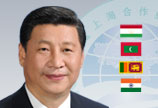
China and Australia to strengthen judicial ties
Comments Print Mail Large Medium SmallMoves aim to deal with money laundering, bring fugitives to trial
China and Australia will make more efforts to deal with money-laundering crimes and recover the illegal assets of Chinese economic fugitives, echoing the 2015-16 G20 Anti-Corruption Action Plan, that was released upon the closing of the G20 Summit in Brisbane on Sunday.
"Our actions are building cooperation and networks, including to enhance mutual legal assistance, recovery of the proceeds of corruption and denial of safe haven to corrupt officials," said the action plan. "We commit to improve the transparency principles of the public and private sectors, and of beneficial ownership by implementing the G20 high-level principles on beneficial ownership transparency."
According to the Chinese Ministry of Public Security, China and Australia will increase their judicial cooperation to deal with crimes and recover the illegal assets of corrupt Chinese officials.
"We will expand intelligence sharing with our Australian counterparts and, when appropriate, we will conduct joint operations to catch the fugitives and confiscate their ill-gotten assets," said a senior official from the ministry who declined to reveal his name.
In recent years, Australia has become one of the top destinations for corrupt Chinese officials to flee, with lots of assets transferred via money laundering.
Although China and Australia haven't signed a bilateral extradition treaty, they have made some progress in bringing back fugitives under the framework of a treaty for mutual assistance on criminal matters signed in 2010, and other international conventions.
Since July, when the ministry initiated a six-month-long special action code-named "fox hunt" to capture economic fugitives abroad, two economic suspects have been brought back to stand trial.
Australia's Financial Intelligence Unit will monitor the suspicious assets Chinese criminals sent to Australian bank accounts and share intelligence with Australian police to conduct further investigation, said Zhang Xiaoming, deputy director-general of the Justice Ministry's Assistance and Foreign Affairs Department.
Chinese police will provide evidence to their Australian counterparts to request their judicial assistance, and "once they identify the funds are illicitly acquired money, they will immediately initiate the judicial procedures to freeze and confiscate the criminal's assets in Australia".
Related Stories
Anti-graft watchdog uncovers over 400 cases of corruption 2014-11-14 20:53
Former SW China deputy mayor probed for corruption 2014-11-14 19:56
Anti-corruption an agenda for G20 summit 2014-11-13 17:07
Gaming revenues to remain flat as anti-corruption drive continues 2014-11-13 11:20
APEC economies decide to launch anti-corruption network 2014-11-11 21:55
New international efforts to fight corruption 2014-11-11 08:09
Background


